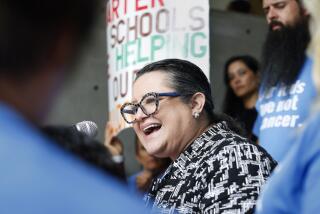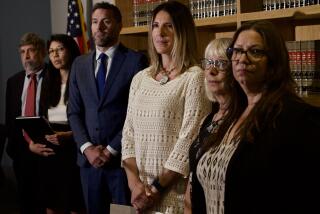Judge backs using student achievement to evaluate L.A. teachers

In a tentative ruling that could potentially transform California teacher evaluations, the Los Angeles Unified School District was ordered Monday to use students’ academic achievement in reviewing instructors.
Los Angeles County Superior Court Judge James C. Chalfant upheld contentions by a group of Los Angeles parents that the district was violating a 40-year-old state law, known as the Stull Act, which requires that teacher evaluations include measures of how well pupils are learning what the state and district expects them to know each year. The law was amended in 1999 to specifically require the use of state standardized test scores as one measure.
Chalfant said the law required the district to use California standardized test scores to determine how well students have mastered state-required material. But he gave the district wide discretion in how to measure pupil progress in meeting its own local academic expectations. Which specific measures are used, how they are incorporated into performance reviews, how the different elements are weighted and how administrators are trained in using them “may well be a matter subject to collective bargaining,” he wrote.
The ruling, while preliminary, lends significant legal clout to a growing movement to use students’ test scores as part of a teacher’s performance review. Several states have begun incorporating them into teachers’ reviews and the Obama administration is also pushing school districts to use them.
Bill Lucia, president of EdVoice, a Sacramento-based educational advocacy group that brought the lawsuit on behalf of the unidentified parents, said the ruling would clear the way for more effective evaluations that will help students and struggling staff.
“It’s more likely we’ll be able to identify struggling staff members and give them the help they need to improve,” he said. “This will be better for kids.”
Warren Fletcher, president of United Teachers Los Angeles, reiterated the union’s opposition to using test scores in performance reviews and said any changes in the evaluation system needed to be negotiated.
“UTLA will not negotiate an evaluation system that creates an incentive to degrade instruction or narrow the curriculum,” he said. “As always, UTLA will obey the law. But it is our job, the district and union together, to negotiate and devise an evaluation system that supports instruction.”
Under Los Angeles Supt. John Deasy, about 700 teachers and principals at about 100 schools are participating in a voluntary evaluation program using a measure based on student test scores known as Academic Growth over Time. Deasy declined to comment on the judge’s ruling Monday.
The union has opposed the voluntary program, saying that test scores are too unreliable for use in such high-stakes decisions as firing, tenure or merit pay. UTLA unveiled its own proposal for an evaluation system earlier this year that uses data to identify areas of student need but not to judge individual teacher performance.
On Tuesday, L.A. Unified board member Steve Zimmer plans to urge his colleagues to reject the use of the district’s ratings in individual teacher evaluations, saying the “utility and validity” of using student standardized test score results have been widely questioned. Instead, the proposed resolution calls for a more diverse set of measurements.
Zimmer said it was critical to break the stalemate between the union and the district over changes in the evaluation system and look for measures that teachers can back. “If this is going to work, there has to be buy-in from teachers,” he said.
In his tentative ruling, Chalfant took to task the district’s current evaluation system. He noted that 99.3% of Los Angeles teachers received the highest performance ratings in 2009-10, yet state standardized test scores that same year showed that only 45% of students performed at grade level in reading and 56% in math.
“These failures cannot be laid solely at the feet of district teachers,” Chalfant wrote. “Students must want to learn in order to do so, and some students can never be motivated to learn. But the district has an obligation to look at any and all means available to help improve the dismal results of its student population.”
The decision rejected arguments by United Teachers Los Angeles, Associated Administrators of Los Angeles and the Public Employment Relations Board that the court had no jurisdiction to rule on the issue. The three groups argued that the state employment relations board had exclusive jurisdiction to resolve contract disputes.
But Chalfant wrote that regardless of collective bargaining rights, the teachers, administrators and employment board “cannot avoid the district’s mandatory legal duty” to use students’ progress in evaluations.
A hearing on the tentative decision is scheduled for Tuesday.
Times staff writer Howard Blume contributed to this report.
More to Read
Start your day right
Sign up for Essential California for news, features and recommendations from the L.A. Times and beyond in your inbox six days a week.
You may occasionally receive promotional content from the Los Angeles Times.







